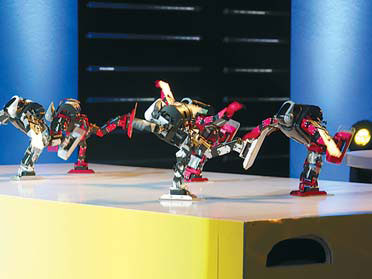A Pineapple in praise of science
 |
|
Dancing robots presented by a research team from Harbin Institute of Technology won the Pineapple Math Award. Provided to China Daily |
"Can counting money relieve pain?" "What is the chemical element that makes chicken soup so delicious?" These brain twisters were among the topics at Saturday evening's Pineapple Science Awards in Zhejiang province's capital Hangzhou.
"The award got its name because I was eating a pineapple when the idea first came to me," says Ji Xiaohua, the founder of Guokr.com, a 3-year-old social network website for science fans, and the initiator of the awards.
In October 2011, after Ji watched "The Ig (short for 'ignoble') Nobel Prizes", an American parody of the Nobel Prizes, for 10 unusual or trivial scientific achievements or research, he wrote a micro blog asking: "When China can have a similar event?"
Li Ruihong, the curator of Zhejiang Science and Technology Museum, quickly responded and helped establish the awards, which took place for the first time this year.
"Pineapple Awards are not simply a Chinese version of The Ig Nobel Prizes," Li adds. "We didn't adopt American mockery, we want our awards to be interesting and rigorous."
Even so, he confesses that some older scientists disagree with the establishment of the awards because they think it's not a good idea to make fun of science.
The judging panel comprises 15 scientists, some TV anchors and entertainers.
"I prefer the unusual topics, but they can't be too difficult for the general public," says Yu Qian, the celebrated Beijing-based cross-talk performer, who is a judge on the panel. "Science can also be discussed in an easy atmosphere. Maybe I will add some science-related jokes in future performances."
But he adds the results are referred to scientists for a final decision.
All the nominated studies must be published by academic journals and generally accepted by academia.
Zhou Xinyue, a psychology professor from Sun Yat-sen University, in Guangdong province's capital Guangzhou, showed counting money and even saying sentences which contain the word "money", can relieve stress, after surveying 500 people. She was bestowed the Pineapple Psychology Award.
"Studying money is as dangerous as studying bombs, because colleagues probably despise it," she joked when accepting a hammer-shaped trophy, which represents "breaking clichd notions".
Hong Bingrong, a computer science professor from Harbin Institute of Technology, Heilongjiang province, won the Pineapple Math Award for his robots, which danced on 2012's CCTV Spring Festival Gala. He says he appreciates the awards slogan: "Pay homage to curiosity".
"Curiosity creates imagination, which can cheer people up and make things different," he says. "Robots used to be simple machines. Who would have expected them to perform on the Spring Festival gala stage? It's like a dream come true."
Hong, the vice-president of Federation of International Robot-Soccer Association, suggests a robot-soccer team will beat a human team one day.
Pan Gang, a computer science professor from Zhejiang University, and his students won a special award called "Pineapple Me", which was given to influential individuals who publicize science.
They designed a water dispenser that is able to automatically update micro blogs with cute words when the water is boiled and the container is empty. It attracted tens of thousands followers nationwide within a few days around Christmas, and was nicknamed "Lady Water Dispenser" by many netizens.
"We did it for fun and never expected it to be so popular," Pan says. "But if we can always do research for fun, we will reach the highest level of science."
He says his team appreciates the awards because they bring scientists and the public closer.
"We cannot submerge ourselves in labs and ignore the public interest. We need to be forward-looking to find out what society needs," Pan says.
His team has developed a "Magic Phone", which can remotely control household appliances, based on a Wi-Fi network.
Barry Marshall, the Australian physician and 2005 Nobel Prize laureate in Physiology or Medicine, attended the award gala as a guest. He expects the award will popularize science further.
"It's good to get young people involved in competitions and create something related to science," he says. "When students get involved, their parents will get involved, and the whole community can see something happening."
"People should keep learning all their life, and science will fill the space for all of us, even after retirement."
Li, the curator, is also positive about the awards.
"Chinese scientific museums spend a lot of energy on popularizing science, but the influence is not ideal because many of us work in a very limited circle and the methods can be mundane," he says.
"Many people therefore think science doesn't have much to do with their daily lives. However, it's a breakthrough to invite the celebrated and cooperate with dynamic media like websites."
Ji from Guokr.com hopes the awards show will be held every year.
"Many scientists have ideas and are willing to share their knowledge with the public, and what we are doing now is merely sowing seeds and waiting for a harvest."
wangkaihao@chinadaily.com.cn






















